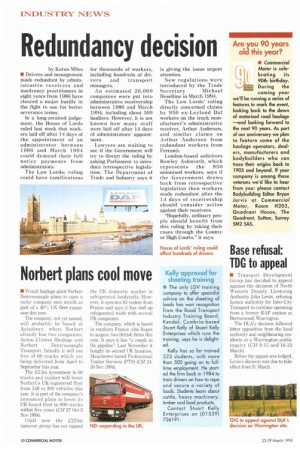Redundancy decision
Page 12

If you've noticed an error in this article please click here to report it so we can fix it.
by Karen Miles • Drivers and management made redundant by administrative receivers and insolvency practitioners in eight years from 1986 have cleared a major hurdle in the fight to sue for better severance terms.
In a long-awaited judgement, the House of Lords ruled last week that workers laid off after 14 clays of the appointment of an administrator between 1986 and March 1994 could demand their full notice payments from administrators.
The Law Lords; ruling could have ramifications for thousands of workers, including hundreds of drivers and transport managers.
An estimated 26,000 companies were put into administrative receivership between 1986 and March 1994, including about 500 hauliers. However, it is not known how many staff were laid off after 14 days of administrators' appointment.
Lawyers are waiting to see if the Government will try to thwart the ruling by asking Parliament to introduce retrospective legislation. The Department of Trade and Industry says it is giving the issue urgent attention.
New regulations were introduced by the Trade Secretary Michael HeseRine in March 1994, The Law Lords' ruling directly concerned claims by 950 ex-Leyland Daf workers on the truck manufacturer's administrative receiver, Arthur Andersen, and similar claims on Arthur Andersen from redundant workers from Ferranti.
London-based solicitors Rowley Ashworth, which represents the 950 unionised workers, says if the Government draws back from retrospective legislation then workers made redundant after the 14 days of receivership should consider action against their receivers.
"Hopefully, ordinary people should benefit from this ruling by taking their cases through the County or High Courts," it says.




































































































